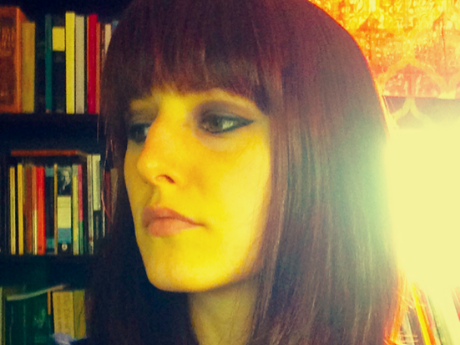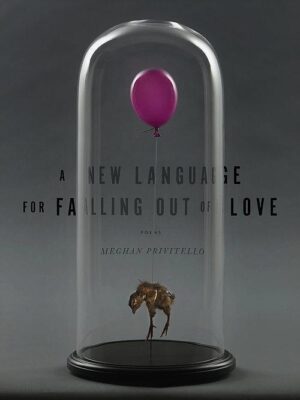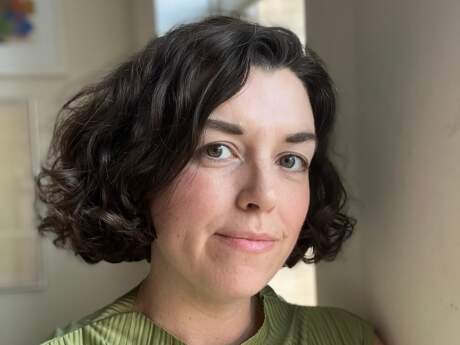In Their Own Words
Meghan Privitello on “The Problem is How”

The Problem is How
What if the best feeling isn't your fake child asleep in your lap, but waking up to a sky so black not even a glass eye shines. What if when your friends found god, you found a bicycle in the woods that could have belonged to a god it was so impossibly golden and apart. There is lettuce stuck to my knuckles which means the earth must be real. There are punches waiting to be thrown which means my nametag says Hi My Name is Human. What if a cliff is another way to say it's finally over, there are no more songs to bring us back to love. When the clock stopped telling time, I stopped telling stories to my hands as if they would live forever. What if your sore throat is your body telling you to say a loud something. What if you cannot love the ground because of the way it always holds you. If you had wings, you could move like a slow child's description of light. If you collected enough stones you could build a mouth which is the only way to say What if I don't want any of this, What if the body was born to float away, What if I go and go and go. There is a rope at my feet that asks to be followed which means there could be a beginning of sadness. There is a trap door beneath every god which means it is endless, which means What if it never ends.
From A New Language for Falling Out of Love (YesYes Books, 2015). All rights reserved. Reprinted with the permission of the author.
On "The Problem is How"
There are poems that answer questions, and there are poems that take you further into the question without any hope for an exit, an exhale, a reckoning. This is a poem without hope of finding its way out.
This poem is born out of anxiety, out of my anxiety. Anxiety towards what? Fear has an object. Anxiety does not. Or anxiety has every object, which is no object in particular, which is a w/hole. Whenever I try to place a pin in the exact site of my anxiety, the pin resists puncture as if there is a magnetic repellence. If I say I am anxious about death, that is not quite right. A fear of death might come closer, but how can one fear something that cannot be talked about, where language disappears as if into a black hole? I think, in the end, every poem I write approaches the tumulus of death. Death as the void of language. Language as the naming of the world. The naming of the world as the proof of our living. And here again I meander, talking around the matter, the dumb little dance of language that amounts to proving, in this moment, that I the writer, and you, the reader, are living, history-full and word-full objects.
What a privilege to be alive. To ask questions without question marks, which are just declarations in disguise.
In this poem and in my life, I have to constantly remind myself that things are okay. That my experience, that your experience, that all of us living things are real. I am always trying to find objects that serve as "good omens." I have to use quotation marks because I don't know if I even believe what I just said. The "What ifs" of this poem are really just an illusion. They suggest that each object/feeling/action could have one meaning, that the world could be simplified in such a way. But behind each object/feeling/action is limitless meaning, limitless destiny. This is where the anxiety comes from—the directionless fear towards infinite meaning, infinite semiosis.
Every poem comes from real life (As opposed to what? Please show me what a fake life is!), but some poems sneak autobiography into the hem. When I was a child, I went through a Harriet the Spy phase with a friend. We wanted to uncover the truth behind people and objects, to reveal the secret histories behind what appeared normal and unimpressive. We had, of course, notebooks and special pens, recording anything and everything we saw: empty soda bottles, bird feathers, a car with license plates from a state a thousand miles away. We also saw, in a small clearing in the woods, a busted up bicycle, the one that makes an appearance in this poem. Why, 20 years later, do I still remember a broken bike? Why did the image force itself like a thumb into my mind, leaving a dimple all these years later that needs to be filled? The bike— surrounded by broken glass, a stuffed animal, a pacifier, an abandoned scenography—was the ghost of an event. What happened here? Where are they now? If these objects were symbols, I wouldn't have much hope for the people they once belonged to. And this is one of my faults—that every object is a symbol of sadness, loss. So: to live in a world surrounded by things is to live in a world of constant anxiety—to repeatedly question the how of living.
This poem is one microscopic slide of the how of living. I think this poem could become a fractal of anxiety. It could grow endlessly in repeating patterns of questioning and grounding until I die.



